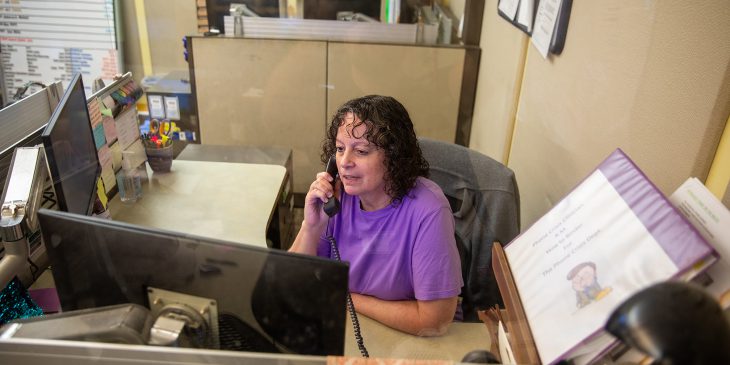This feature includes references to and accounts of difficult situations related to mental health, including suicide and abuse. If you are in crisis or need support, reach out to the Suicide and Crisis Lifeline via phone or text at 988.
It was midday on a weekday when Robin McQuillen saw a new chat notification come in. It came from a high school student texting from his phone at school. He was reaching out because he was serious about ending his life that day.
The student was in another part of the country from Robin’s home base at resolve Crisis Services in Pittsburgh, and he shared that he was physically abused at home. He felt he couldn’t face another day, wasn’t sure he had any other options, and reached out in desperation to 988, the national Suicide and Crisis Lifeline.
As a crisis clinician with resolve, part of UPMC Western Behavioral Health, Robin was the steady presence on the other side of that line.
Robin’s training kicked in and she began typing back to the boy: Can you excuse yourself from class? You don’t need to make a scene; just say you have to go to the bathroom. Now I want you to go to an adult you can trust. Is there a teacher or counselor you feel like you can trust? Or the principal? I know it’s hard, but I really need you to go to someone safe. I need you to tell that person what is going on with your dad so they can help and protect you.
While many encounters through 988 are phone calls, some also come through as web chats or text messages. Those, Robin explains, can pose an extra challenge for the crisis clinician handling the encounter: You can’t hear the individual’s tone of voice, or any background noise for context. At times you can’t be certain they’re even still engaged with you.
“With chat text, sometimes they disconnect and there’s no way to get back with them, no way to track them down.”
In this case, Robin kept up with the high schooler as he followed her advice and tracked down the headmaster of his private school.
“I was doing a lot of waiting, hoping he was still there, that kind of thing,” Robin recalls. “But then he was able to go talk to them. They then contacted the counselor, and they were calling CYF,” the local office of Children, Youth, and Families.
The texts didn’t end there. Robin heard the kind of relief closure she and more than 250 crisis specialists with UPMC Western Behavioral Health aim for with every encounter they have.
“They’re calling CYF. They’re coming to see me at school,” he texted her. “They’re not sending me home.”
“He said to me, ‘You saved my life today,’” Robin says. “He really was going to do something drastic after school that day.”
It was a moment that stuck with her: “He was doing every-thing right. And then he was able to express that back to me. That was really impactful.”
‘The Caller Defines the Crisis’
A mental health crisis can take many forms, and there’s no strict definition of what counts as a crisis and what doesn’t.

Tracy Carlini
“The caller defines the crisis,” explains Tracy Carlini, crisis clinician supervisor, UPMC Western Behavioral Health at Safe Harbor. “My crisis would be different than yours. We support them through whatever they’re going through: It could be that they’re having thoughts of suicide or homicide. It could be that they’ve experienced a breakup and they’re just really struggling and they’re sad. It might be grief and loss. It might be parents really struggling with their child’s behaviors issues.”
Answering these kinds of calls as part of the 988 Suicide and Crisis Lifeline network is one part of what the UPMC Western Behavioral Health teams — clinicians, therapists, nurses, and social workers — do daily to support individuals in crisis in the regions UPMC serves and beyond. At UPMC programs including resolve Crisis Services in Pittsburgh, UPMC Western Behavioral Health at Safe Harbor in Erie, UPMC Western Behavioral Health Altoona Crisis Services, and UPMC Western Psychiatric Hospital Beaver Crisis Services. Teams support urgent behavioral health needs in the community through phone hotlines, mobile services, walk-in services, addiction services, and some specialized programs tailored to specific communities.
In the context of the behavioral health continuum of care, crisis services are similar to emergency or urgent care in the world of physical medicine. Crisis response teams, whether they’re working through their own local crisis hotline or the national 988 number, or responding along-side police, encounter and treat people with acute behavioral health needs.
“We provide that safety net that sort of extends services at nontraditional times,” says Mandy Fauble, director, Clinical Care Services, UPMC Western Behavioral Health, who oversees crisis services across the organization.
Once the acute need is addressed, the team shifts its focus to get the person in crisis into a better situation long term, through connections with community resources or treatment options. That may mean hospitalization, but often it doesn’t.
“Our goal is to provide the right level of care at the least restrictive means possible,” explains Zach Cathcart, crisis clinician, Safe Harbor. “Whatever that looks like, whatever will meet the person’s needs and help them work through the crisis they’re experiencing.”
UPMC typically collaborates with county governments in Pennsylvania, which fund many behavioral health care services for their local communities. But because the 988 program is a federal program, run by the Substance Abuse and Mental Health Services Administration, it is not operated at the county level. Some service providers are fielding phone calls from several counties concurrently, and even responding to text and chat messages that come in from across the country — as was the case with Robin and the high school student she helped. Being a 988 provider also comes with a higher level of training and requires compliance with strict quality metrics.
“It’s a feather in our cap” as a service line and as an organization, according to Mandy. Working with 988 allows UPMC’s crisis teams to “transform the system to be responsive to citizens in our communities.”
Like many first responder roles, behavioral health crisis response largely attracts a specific type of person: To be successful in the role, you have to be calm under pressure, knowledgeable, and supremely empathetic. Self-care is an absolute must.
“I always come from a compassionate standpoint and an empathetic standpoint,” says Dawn Blair, crisis clinician, resolve Crisis Services. “It’s hard as a helper, being in the helping profession, to turn those qualities around to apply to your life.”
That’s where team support comes in.
“Those of us who work in the office have the support of getting off the call and being able to talk to someone who can be there and be sympathetic and listen to you,” says Robin, with resolve. “And say, ‘Yeah, that was a tough call.’ I try to do all of the outside self-care things too, but that, to me, is a big part of it: being able to have those people right there to talk to.”
That support, for the community and for one another, is some-thing that makes UPMC’s crisis teams an unforgettable group.
“Once you start meeting the team, instantly you’re drawn in and you get it,” says Noreen Fredrick, vice president, Community and Ambulatory Behavioral Health Services, UPMC Western Behavioral Health. “And I think it’s a service that we collectively as a system should be incredibly proud of. Just like all the other emergency responders that we have, this is another group of emergency responders who are just very dedicated. It’s a group you feel energized to be around.”
“They make you realize: This is why we do this.”
Read more about UPMC Western Behavioral Health crisis services, including services offered in the field in Pittsburgh and Erie, and some tips from the experts on how to approach a situation in which you or a loved one faces a mental health crisis.









